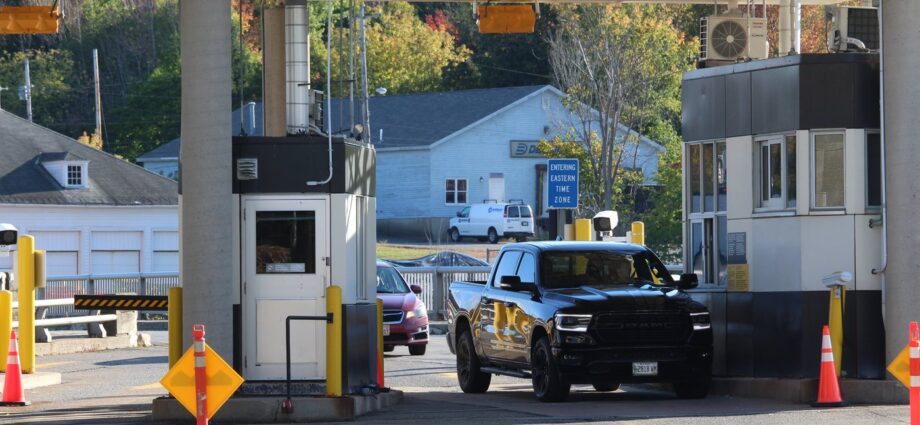
By Rhythm Rathi, Local Journalism Initiative Reporter, Telegraph-Journal
October 7, 2022
With Canada having removed the COVID-19 travel restrictions for visitors as of Oct. 1, the United States should reciprocate for its visitors, says New Brunswick Southwest MP John Williamson.
Williamson, whose riding hugs the Maine border, said residents of New Brunswick border communities frequently travel into the U.S. to see their friends and family, as well as to seek essentials. In some places, he said they also share first responders for assistance, especially in Charlotte County.
“President Biden said the pandemic is over and it’s not right for the U.S. to maintain this [proof of vaccination] restriction on Canadians as a requirement to enter Maine or other points in the United States,” he said in an interview Thursday. “Canada rightly removed the vaccine requirement to enter our country and the Americans should now do the same thing.”
Starting on Oct. 1, the Canadian government dropped mandatory masking, testing, quarantining and providing proof of vaccination for all travellers entering the country by air, land or boat, according to the Government of Canada website. ArriveCan submissions were also deemed optional, according to the U.S. Embassy and Consulates in Canada website, but “the Centers for Disease Control and Prevention’s (CDC’s) Order requiring proof of vaccination for non-U.S. citizen non-immigrants to travel to the United States is still in effect.”
As a result, on Sept. 29, the New Brunswick government extended its subsidization of off-season ferry service for those on Campobello Island as residents’ only other option of accessing mainland New Brunswick is crossing the Franklin Delano Roosevelt Bridge into Lubec, Maine.
Accessing Canada through Lubec calls for “crossing the border four times (two times each way),” a provincial press release stated, and so the ferry service will be subsidized now on a month-to-month basis, allowing the ferry to “continue operating four days per week, weather permitting, at the regular off-season service levels.”
Williamson said Campobello is “in the toughest spot because of its location,” and “without the ferry, the decision would trap people on the island.”
To date, New Brunswick has provided a total of $882,000 in subsidies to keep the Campobello ferry operating during its off-season since the start of the COVID-19 pandemic, according to Tyler McLean, spokesperson with the Department of Transportation and Infrastructure, in an email.
In 2020-21, the ferry was subsidized to the tune of $381,000, and in the 2021-22 season, to the tune of $501,000.
Campobello Mayor Harvey Matthews said Thursday he was unaware of the province’s move to extend the ferry service on a month-to-month basis, and it came to him as news when the press release was sent out. He said he has neither received a response from the province about funding to make the ferry permanent nor has any information about how long the province will subsidize it.
“I think the province should at least give us an idea if (a permanent ferry is) attainable.”
Matthews said he assumes the province might stop subsidizing the ferry once the U.S. lifts its travel restrictions and that could be in the near future. He added that to his knowledge there is not much talk on the island about the restrictions, and although he does recognize it as an issue he said the islanders have lived without an-off season ferry earlier.
As Campobello Island residents were previously being exempt from showing their proof of vaccination while crossing through Maine to access gas and essentials, Matthews said the residents have developed an understanding with the U.S. border guards and proof of their inoculation is seldom asked. He said he thinks he has “been asked twice the whole time it’s been a thing.”
Williamson has been advocating for funding for a year-round ferry. In a March 23 letter he wrote to Chrystia Freeland, Canada’s deputy prime minister and minister of finance, he requested funding accommodations in the 2022 budget for “a year-round ferry between Deer Island and Campobello,” noting the intra-provincial ferry network in British Columbia has received an annual grant since 1977. He noted that grant is now $30 million a year.\
Williamson said he has also had conversations with Premier Blaine Higgs that “New Brunswick should be treated the same as British Columbia.” He said it is the province that will have to talk to the federal government to further make it possible, but he is working in Ottawa to find funding supports.
The Telegraph-Journal requested an interview with Minister Jill Green, of the Department of Transportation and Infrastructure, but she was not available for an interview as of press time. The newspaper also reached out to Saint John Croix MLA Kathy Bockus for a comment, but it did not hear back as of press time.
Williamson said the pressure on the White House from both Canadian and U.S. lawmakers in border communities will result in a decision on travel restrictions into the United States. He noted both countries are known to share the world’s longest undefended border.
Subscribe to our newsletter.
“And by that, we mean the border is easy to cross and there is very little difficulties, but with this mandate requirement that’s still in place it’s not an easy border to cross for a lot of Canadian citizens.”



